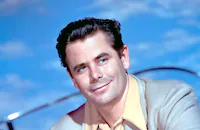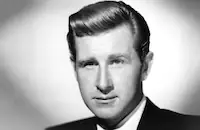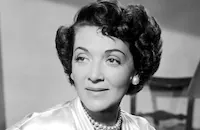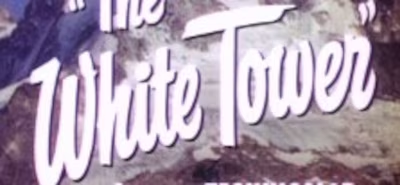The White Tower

Brief Synopsis
Cast & Crew
Ted Tetzlaff
Glenn Ford
Alida Valli
Claude Rains
Oscar Homolka
Sir Cedric Hardwicke
Film Details
Technical Specs

Synopsis
In a Swiss Alpine village, mountain climber Carla Alten, who has just arrived from Italy, organizes a climbing party, intending to scale the nearby "White Tower" peak. Although Carla's dear friend Andreas, a veteran mountain guide, warns her that none of the local guides wants to join her party because of what happened to her and her father years before on the Tower, Carla is undaunted. Carla, whose father, a world-renowned mountaineer, died while trying to reach the top of the infamous Tower, asks American Martin Ordway to make the climb. Despite his attraction to Carla, Martin, a former bomber pilot who has been drifting since the war, declines the invitation, stating that he has no reason to go. Carla then asks English naturalist Nicholas Radcliffe, another old friend, and Paul Delambre, an alcoholic French author who has been writing a novel about the Tower, to join the group, and they both gladly accept. At Martin's urging, Carla puts aside her anti-Nazi sentiments and also asks Hein, a hearty young German, to go. That night, Paul tells his beautiful but disapproving wife Astrid that he is making the climb in order to "come alive again," but she makes no effort to understand him. Just before the group is to depart, Martin observes Carla praying fervently at her father's gravesite and, moved by the intensity of her devotion, decides to accompany her for part of the trip. Soon after starting the climb, Paul and the middle-aged Nicholas stop briefly for a rest and are criticized by Hein. Hein then dismisses Andreas' declaration that they have come to an impasse in the rock face and forges ahead to the next level. While trying to climb the same difficult stretch, Nicholas almost falls, but is saved by Hein. Despite protests from Carla, who feels strongly that the group should remain together, Nicholas announces that he is turning back. Andreas insists on accompanying Nicholas for part of the way down, but Hein, who compares mountain climbing to war, refuses to wait for the guide and pushes on with Paul. Once alone with Carla, Martin confesses his love and proposes, but Carla turns him down. After Andreas finally returns, he, Carla and Martin brave a blizzard to catch up to Hein and Paul. Exhausted by the day's climb, Paul starts to drink and announces he is quitting. Hein argues with Carla about Paul, stating that he would rather go on alone than be saddled with a weakling. The next morning, Martin, disturbed by Hein's fascistic selfishness, tells Carla that he has decided to climb to the top. The group is snow and fogbound, however, and Paul is dazed and drunk. When the sky clears, Paul chooses to remain behind, but tells Carla that she must continue in order to vanquish the demons of her father's death. He then advises Martin to go with her, as the journey will help redefine his life. After Andreas instructs Paul to stay in his tent until the group returns in two days, he leaves with the others. That night, however, during another blizzard, a drunken Paul, having finally finished his novel, knocks over his tent stove and wanders into the storm, unaware that his tent has caught on fire. The next morning, Andreas leaves to check on Paul, promising to return as soon as possible. Calling the peasant guide "superstitious," Hein predicts that Andreas will not return the following day, as it is a Sunday. When Martin angrily denounces Hein as a relentless Nazi, Carla tries to quiet the American and is accused of putting the mountain before everything. Carla and Martin awaken the next day to discover Hein gone, and an infuriated Martin insists on pursuing the German alone. While Carla waits for Andreas, who finally returns, having determined that Paul is dead, the ill-equipped Martin follows Hein's snowy footprints to the mountain top. Tired and almost snowblind, Martin finally catches up to Hein, who calls him inferior and inches cockily on to a snow cliff. When Hein becomes trapped on the cliff, Martin offers his hand, which the German grudgingly accepts. Despite Martin's help, Hein falls to his death, and Martin passes out just before reaching the top. Eventually, Carla and Andreas reach Martin, and realizing that he cannot continue, Carla declares the climb over. Back in the village, Carla tends to Martin's eyes and finally agrees to marry him.

Director

Ted Tetzlaff
Cast

Glenn Ford

Alida Valli

Claude Rains

Oscar Homolka

Sir Cedric Hardwicke

Lloyd Bridges

June Clayworth
Lotte Stein
Fred Essler

Edit Angold
Irmgard Dawson
Crew
Robert Aldrich
C. Bakaleinikoff
Samuel E. Beetley
Fred Bentley
Ralph Berger
Mel Berns
Tony Braun
Norman Breedlove
Albert S. D'agostino
Phil Eastman
Larry Germain
John Hamilton
Paul Jarrico
Richard Kinon
John Livesley
Harley Miller
Morgan Padelford
Clem Portman
Ray Rennahan
Sid Rogell
Ruby Rosenberg
Darrell Silvera
Rod Tolmie
Willard Turner
James Vaiana
Richard Van Hessen
Roy Webb
Harold Wellman
Tex Wheaton

Film Details
Technical Specs

Articles
The White Tower
Based on the book by novelist and mountain climber James Ramsey Ullman, The White Tower brings together an American GI (Glenn Ford), a disillusioned writer (Claude Rains), a British naturalist (Sir Cedric Hardwicke), a local guide (Oskar Homolka), a closet Nazi (Lloyd Bridges) and a local woman (Alida Valli from Alfred Hitchcock's The Paradine Case, 1947), daughter of a famous climber, who is determined to conquer the mountain where her father died. Each character has his or her own reason for climbing the White Tower and will confront their true nature in the mist and snow of its dangerous peaks.
Adjustment to the post-war climate and the emerging House UnAmerican Activities Committee hearings affected the production of the film itself. The White Tower was originally slated to be produced by Adrian Scott (Murder, My Sweet, 1944, Crossfire, 1947) and his directing partner Edward Dmytryk, but was handed over to Sid Rogell (Blood on the Moon, 1948) and Ted Tetzlaff (Notorious, 1946) when Scott and Dmytryk were blacklisted, becoming part of the "Hollywood Ten." Ullman's novel was adapted for the screen by Paul Jarrico (Thousands Cheer, 1943, Song of Russia, 1944), who would also be blacklisted shortly afterward.
Lloyd Bridges was also questioned by the HUAC for possible involvement in the Communist Party, but was cleared by the FBI and resumed his career. By the time he appeared as the unrepentant fascist in The White Tower, Bridges had already established himself in adventure movies. He made the successful transition to television and by 1958 was in one of the most popular TV series of that era - Sea Hunt.
Like the character he plays in The White Tower, Glenn Ford's life was interrupted by WWII. His successful career was put on hold during his military service and when he returned his career took off after he appeared in Gilda (1946) and continued to flourish during the '50s and '60s.
Alida Valli (she went by the single name "Valli" during her Hollywood years), was born in Pola, Italy - now Croatia. She was billed as the next Garbo, having made a name for herself in WWII Italy. In those early days of her European career, she briefly abandoned acting when she refused to appear in what she felt were Fascist propaganda films. After lukewarm success in the States, she returned to Europe in 1951, where she was much more successful in her film career, starring in such prestigious movies as Luchino Visconti's Senso (1954), Michelangelo Antonioni's Il Grido (1957) and Georges Franju's Les Yeux Sans Visage (1960).
As for co-star Claude Rains, David J. Skal in his biography An Actor's Voice: Claude Rains wrote that The White Tower "has the rare distinction of being one of the few that resulted in a bad notice for Rains. Bosley Crowther of the New York Times stated flatly, "Claude Rains, as a garrulous weakling, is something of a bore, and Sir Cedric Hardwicke, as another, is pathetic." Rains's primary memory of the uncomfortable location shoot was enduring near-frostbite and receiving full-body brandy rubdowns from a nurse."
Producer: Sid Rogell
Director: Ted Tetzlaff
Screenplay: Paul Jarrico; James Ramsey Ullman (novel)
Cinematography: Ray Rennahan
Art Direction: Ralph Berger, Albert S. D'Agostino
Music: Roy Webb
Film Editing: Samuel E. Beetley
Cast: Glenn Ford (Martin Ordway), Valli (Carla Alton), Claude Rains (Paul DeLambre), Oskar Homolka (Andreas), Cedric Hardwicke (Dr. Nicholas Radcliffe), Lloyd Bridges (Mr. Hein), June Clayworth (Mme. Astrid DeLambre), Lotte Stein (Frau Andreas), Fred Essler (Knubel), Edit Angold (Frau Knubel).
C-99m.
by Emily Soares

The White Tower
Quotes
Trivia
Notes
Contemporary news items add the following information about the production: RKO purchased James Ramsey Ullman's novel in March 1946 for $150,000. At that time, Edward Dmytryk was assigned to be the film's director, and Ullman was to work on the script. Credited writer Paul Jarrico's first draft of the screenplay, which was completed in early April 1947, reportedly eliminated the "allegorical implications of the novel," because they were deemed "no longer valid." These "nationalistic allegories of the war period," however, were present in the final draft of the script. Ullman's contribution to the final screenplay has not been confirmed.
In January 1947, Lilli Palmer was announced as the lead in the production, which was to begin in Switzerland in June 1947, following six months of research and preparation. L. P. Williams was assigned as art director at that time, William E. Watts as executive production assistant, Ruby Rosenberg as Dmytryk's assistant, and Ullman as technical advisor. By April 1947, however, "upset conditions in Europe" caused principal photography to be postponed, and RKO announced in mid-April that the picture was to be filmed in the Canadian Rockies and Hollywood. On April 14, 1947, RKO sent Dmytryk, art director Alfred Herman, cameraman J. Roy Hunt and location director Lou Shapiro to Calgary and the Canadian Rockies to do tests. By April 21, 1947, however, the studio declared that it was shelving the project for at least a year because of casting difficulties, labor problems in Switzerland and the release of Monogram's High Conquest (see entry above), another mountain climbing film. (Although both High Conquest and The White Tower predated Sir Edmund Hilary's scaling of Mt. Everest by a few years, mountain climbing had become a very popular pursuit after the war.) Variety also reported in September 1947 that the Canadian Rockies had been ruled out as a location because they were not "sufficiently similar" to the Alps. Paul Lukas was slated for a starring role in the picture during its 1947 production tenure. Of the above-mentioned crew members, only Ruby Rosenberg has been confirmed as contributing to the final film.
RKO did not resurrect The White Tower until mid-1949. While the project was on the shelf, Dmytryk and his RKO collaborator Adrian Scott were indicted for contempt of Congress during the HUAC hearings and were fired by RKO. (For more information about Dmytryk and Scott's involvement with the HUAC, see entry above for Crossfire.) Irving Allen and Franchot Tone, producers of The Man on the Eiffel Tower , a 1949 RKO release, were then set to produce the film. Rudolph Maté was to direct the picture in the southern Alps, with Tone, Glenn Ford and Oscar Holmolka in the cast. By June 23, 1949, however, Ted Tetzlaff had taken over as director, and M-G-M contract player Janet Leigh was announced as the film's new star. Also in late June 1949, photographer Richard Angst and production designer René Renoux were hired to work with credited Swiss cinematographer Tony Braun on the picture, which, at that time, was to be shot in Switzerland in Ansco Color.
On June 28, 1949, John Garfield was announced as Ford's replacement and Valli, as Leigh's. Ford had reportedly accepted the part on condition that Leigh also be cast, and when Leigh's loan-out deal with M-G-M fell through, Ford backed out of the picture. Despite the loss of Leigh, Ford returned to the project the next day, but pulled out again a week later because of a salary conflict. During Ford's absence, Tone stepped down as co-producer, and Mel Ferrer was announced as Ford's possible replacement. Irving Allen was to stay on as supervising producer, but his contribution to the completed film has not been confirmed. In mid-July 1949, just before the film crew, led by Technicolor photographer Ray Rennahan, was to leave for France, Ford was re-signed at a salary of $125,000. Valli was to receive $75,000. In late June 1949, Richard Basehart was announced as a cast member, but did not appear in the completed film. Although Hollywood Reporter stated that Valli was to be billed using her full name-Alida Valli-for the first time "in several years," her onscreen credit remained "Valli."
Second-unit filming, which consisted of trained climbers and doubles, was done in Chamonix, just north of Mont Blanc, France, the highest peak in the Alps (15,781 feet). Principal photography was also done in the French Alps, using Eastman Mono-Pack color instead of Ansco, and at RKO-Pathé studios in Culver City, where Technicolor stock was employed. For the studio filming, a mountain set was constructed. Mountain and snow photographer Andre Roche was to do stills for the picture, but his contribution to the final film has not been confirmed. It is not known if any of the Canadian background footage was used in the completed film.















